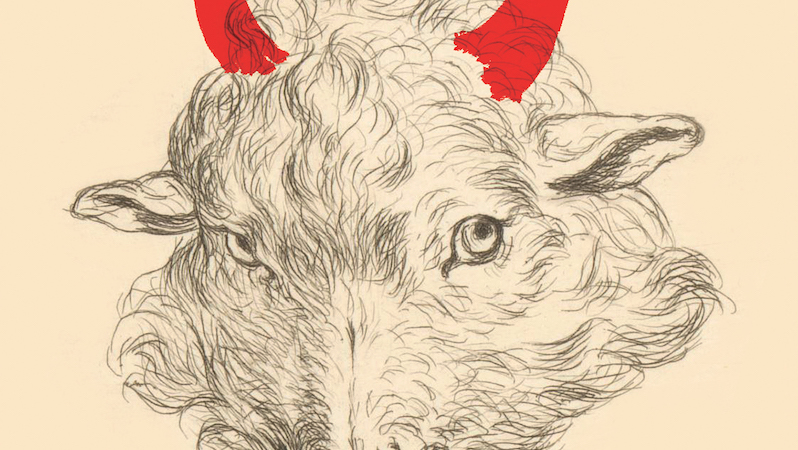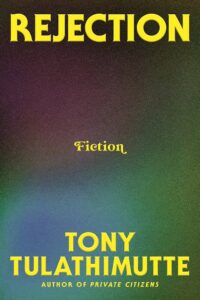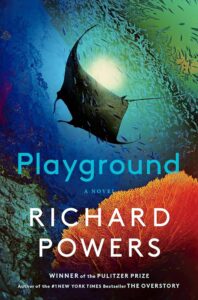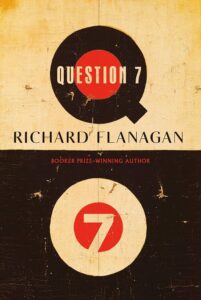
Our basket of brilliant reviews this week includes Parul Sehgal on Garth Greenwell’s Small Rain, Madeline Leung Coleman on Tony Tulathimutte’s Rejection, Todd Shy on Jamie Quatro’s Two-Step Devil, Xan Brooks on Richard Powers’ Playground, and Michael Dirda on Richard Flanagan’s Question 7.
“Pain, it has been said, is the great censor, the eater of words. Pain shatters language; it remains untranslatable—not just anti-narrative but pre-narrative, calling us back to our first sounds. In the canon of illness writing, there are those accounts…which closely observe how pain shapes a life, how it exists both within and alongside the self as antagonist and intimate companion (Nietzsche called his chronic pain his dog). Typically, however, writers do not sit long with their pain; they busy themselves with the history, the social meanings of sickness. Pain, on its own, seems to have no plot; as Emily Dickinson wrote, it ‘has an Element of Blank.’ Perhaps it is a great anatomist of pleasure who can fill in some of the blanks in the story of pain … His previous books were closely observed minuets of pleasure, power, humiliation between lovers. Small Rain again reports from the site of the narrator’s body, the body in the hands of strangers. The narrator becomes conversant in a new language—the language of the medical system—and a new vocabulary of touch. He learns whose hands are efficient, and whose are clumsy, whose touch renders him a body, a problem, or a person … This is the real setting of Greenwell’s fiction—not the hospital, the classroom, the night clubs in Sofia, but this space that exists within them, within ordinary life, a realm unlatched by those forked sentences, in which time is slowed, and a deep, receptive kind of contact with the other, with the self, is permitted to bloom.”
–Parul Sehgal on Garth Greenwell’s Small Rain (The New Yorker)

“It would be easy to call Rejection an ‘incel novel’—especially because it starts with a man who’s denied sex by nearly every woman he pursues. That label would tell you how angry these characters are, how vain their efforts, how stunted their worldviews. It summons their yearning and guarantees their failure. But the seven interlocked stories in this book, the second by Tony Tulathimutte, go deeper and fouler than inceldom. In Rejection, sexual failure is only the fruiting body; self-hatred, nihilism, and shame are the mycelium that makes the fungus grow … Described this way, Rejection sounds unbearable, a human centipede of misery crossed with a brain worm becoming an Ouroboros. And yet it works. And it’s funny. Tulathimutte has a gift for horrible images, for scratching a low point till it bleeds … Rejection is a more mature work [than Private Citizens]. Even with all the cumming and crying. Tulathimutte seems newly ready to go all the way to the bottom; he no longer minds if we think these people are pathetic, so he lets us in on the joke … Not all the book’s judgments feel so intentional. This feels like the right time to mention the Asian-women thing…You don’t have to squint to see the pattern, how these assumptions about the effortless sexual power of small Asian women are smuggled in through the eyes of non-male characters and set in obvious contrast to the Asian men Tulathimutte writes about. In Tulathimutte’s writing, small Asian women are the only ones everyone wants…You start to miss the horrible men, rubbing themselves raw. Luckily, or not—your mileage may vary—we get back to them quickly. And to so many other places, too, including a truly bravura description of a sexual fantasy … Turns out blue balls can kill a guy. They can also make a really good story.”
–Madeline Leung Coleman on Tony Tulathimutte’s Rejection (Vulture)
“The novel isn’t a sermon or a hymn. Even a novel as filled with love and religious life as Marilynne Robinson’s Gilead (2004) is a portrait of generational tension as well as a kind of wondrous benediction in the face of that tension. To read or write literary fiction as a believer is to put belief at risk, to submit it to pressures it may or may not withstand. Without that risk, fiction becomes allegory, or maybe honest sentiment—comfort food—but not what Elie called for, an account of our predicament … Quatro’s first two books, then, explore in various ways the relationship between faith and desire, and there is nothing straightforward about her treatment of either. Her new novel, Two-Step Devil, stretches her canvas much wider. The themes of family and faith are very much present, and we grow even more familiar with the Lookout Mountain region that has become Quatro’s postage stamp. Her ambition is large, and religious belief still frames that ambition … Quatro is never sentimental. One of the achievements of Two-Step Devil is the way the encounter with the young girl leads the Prophet forward, not entirely out of his delusional visions but away from their dominance and toward a simpler sublime … She will not let us have the happy ending we might prefer. The words that end this morally difficult, emotionally devastating account of a young foster child sound like an accusation but feel like a plea. ‘This is a story we all know,’ Quatro writes, as we tumble where we hoped the story wouldn’t go. ‘Don’t you dare call it a crime.’ There is something startling in that direct address, something moving in the assertion of collective ownership, collective responsibility. This is Quatro’s solution to the problem of portraying faith in literary fiction: relentless pressure shapes a final, but never triumphant, redemptive release. But the pressures must be particular pressures, and the releases particular releases. This is the key, the only key, to writing that assesses us and takes our measure through the lens of religious belief.”
–Todd Shy on Jamie Quatro’s Two-Step Devil (Comment)

“Themes of transformation, loss and regeneration abound in Richard Powers’s Booker-longlisted Playground, a transcendentalist deep dive of a novel that at times almost caves under the weight of its ambitions. Ostensibly, it spins the tale of Makatea, a Polynesian atoll that finds itself preyed on by a consortium of shadowy Californian investors who want to build modular parts for vast floating cities. But that’s only the surface narrative, a protruding rock to navigate by. Playground freely references The Tempest with its framing of Makatea, an island haunted by its past and ripe for exploitation, and cites Arthur C Clarke, who said that the planet we live on should by rights be named Ocean. What we think of as Earth is ‘the marginal kingdom,’ an ancillary to a main stage that occupies 70% of the globe. The real story—the real treasure—can be found in the water … What a lush, opaque world Powers conjures for us here. Just as Evie Beaulieu longs to interpret the ‘liquid text’ of the sea, so the reader has to regularly reorient themselves in order to keep track of the plot’s braided streams. Playground is the American author’s 14th novel, although it carries tantalising echoes of its immediate predecessors. Like 2018’s arboreal epic The Overstory, it’s a book bewitched by the concept of intelligent alien life in our midst (trees there, fish here). As with 2021’s dystopian Bewilderment, it’s drawn to the virtual frontier of generative AI and its potential to both raise the dead and draft an alternative present. If the tale’s disparate elements (rites-of-passage drama, marine adventure, environmental cri-de-coeur) never entirely cohere, that’s probably as it should be. Playground works best as a fabulous exploration. It points out the sights, provides background and asks open-ended questions. After that, we’re largely on our own.”
–Xan Brooks on Richard Powers’ Playground (The Guardian)

“Flanagan has produced a kind of philosophical fantasia, a highly original weaving together of a half-dozen essayistic narratives about the sad, wondrous world we all live in … Flanagan’s father survived his ordeal only because the United States bombed Hiroshima. If the Americans had invaded Japan, he would have been instantly murdered or used as a human shield. Thus Flanagan himself would never have been born were it not for an act that instantly vaporized some 60,000 civilians and left others to a slow, lingering death. Yet the bombing of Hiroshima was, Flanagan is convinced, a heinous, deeply immoral act—and it came about, he says, because of a book … Once Flanagan visited a friend’s house when the other boy’s tired, drunken father picked up a trumpet: ‘A life spent listening to music since has been for me no more than an endlessly recurring attempt to recapture those moments in which a drunk miner enchanted me with his trumpet playing, some clear, joyful wonder that pierced and uplifted the wounded world around it’ … In the brief description of Question 7 cited above, Peter Carey ends with a surprisingly bold declaration: ‘We are all competitive, of course, so this is not an easy thing to say: but Question 7 may just be the most significant work of Australian art in the last hundred years.’ That seems a tad hyperbolic but, possibly, only a tad.”
–Michael Dirda on Richard Flanagan’s Question 7 (The Washington Post)

